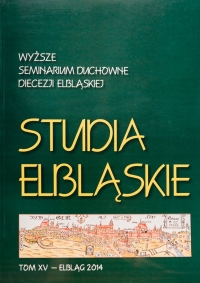Polityka jako roztropna realizacja dobra wspólnego. Ujęcie Mieczysława Alberta Krąpca
Politics as the prudent realisation of the common good. The view of Mieczysław Albert Krąpiec
Author(s): Danuta Radziszewska-SzczepaniakSubject(s): Philosophy, Ethics / Practical Philosophy, Political Philosophy
Published by: Wyższe Seminarium Duchowne Diecezji Elbląskiej w Elblągu
Keywords: politics; common good; prudence; Mieczysław Albert Krąpiec OP
Summary/Abstract: Defining politics as prudent implementation of the common good has a long tradition. This is the spirit in which politics was understood by Plato, Aristotle, the Stoics and – later on – by the great Christian thinkers with Augustine and Thomas Aquinas as the most prominent examples. It was them that Father Professor Mieczysław Albert Krąpiec referred to in his dissertations on politics. His viewpoint on politics is marked by two elements. First, it is seeing the common good as the personal development of a human being. Only when understood this way, may the common good be real good for each individual person and at the same time – real good for the entire community. Second, it is acknowledging that the method of implementing the common good must be determined by the virtue of prudence. For it is prudence, including “past experience, the skill of reading and understanding the present in the context of other people and consideration for the consequences of one’s intended actions”, that enables one to choose such methods of organizing the social, economic and cultural life as well as any other public sphere, which will actually facilitate the self-improvement of a human being.
Journal: Studia Elbląskie
- Issue Year: 2014
- Issue No: 15
- Page Range: 315-331
- Page Count: 17
- Language: Polish

